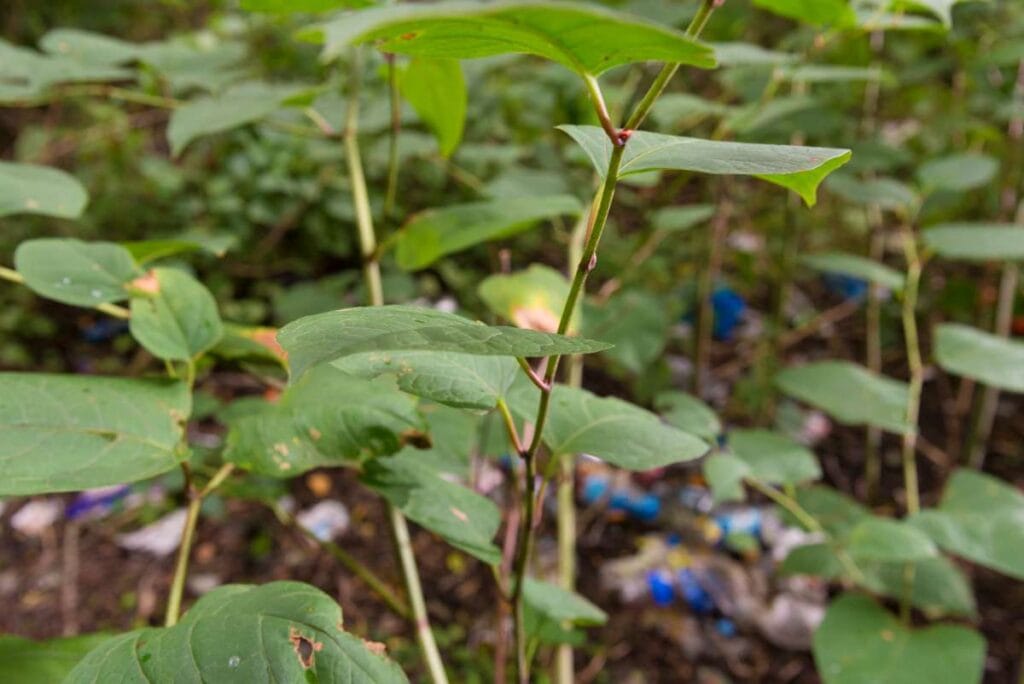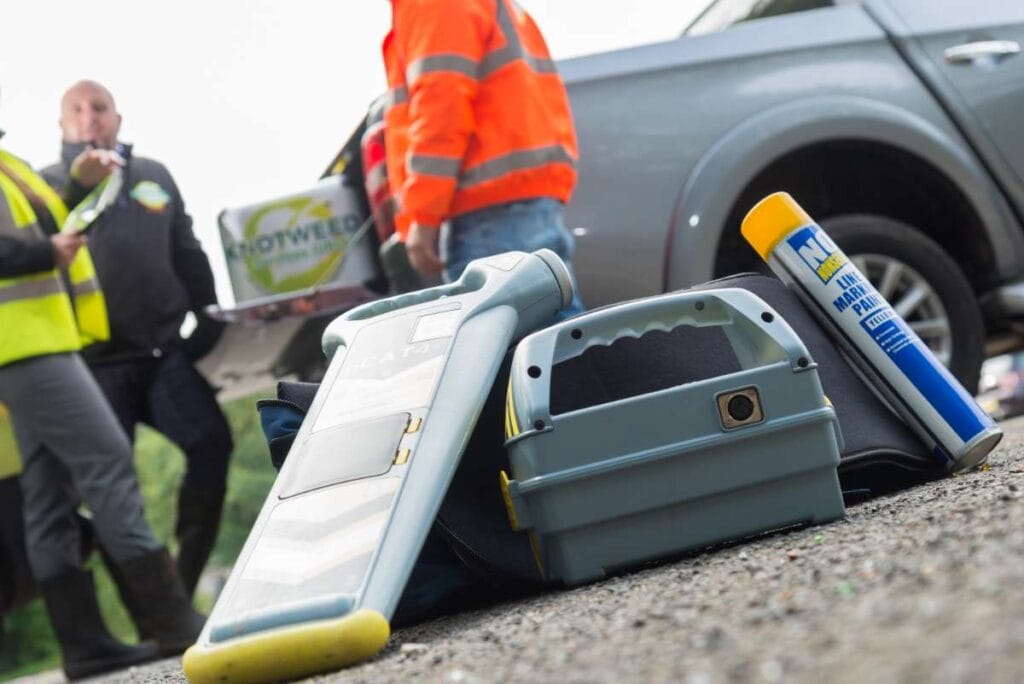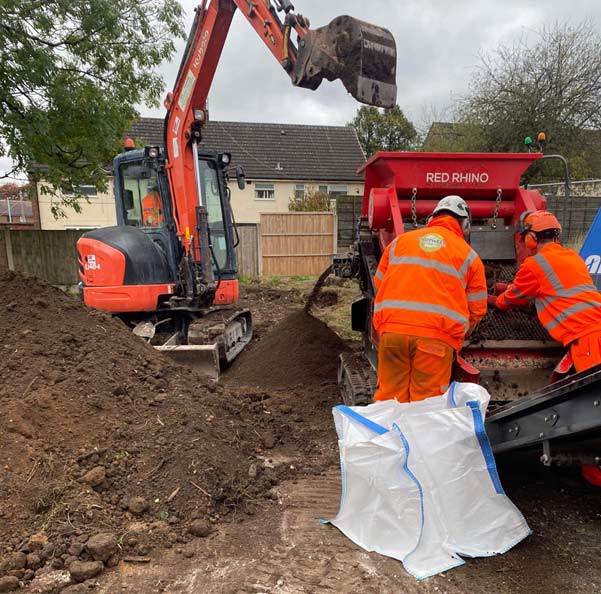JAPANESE KNOTWEED REMOVAL Farnborough
2
LIVE KNOTWEED JOBS IN Farnborough
89
SUCCESSFUL KNOTWEED REMOVAL PROJECTS IN Farnborough
100%
SUCCESSFUL PROPERTY SALES AFTER TREATMENT
1
Farnborough BASED KNOTWEED STAFF
NO OTHER JAPANESE KNOTWEED COMPANIES IN Farnborough HAVE OUR TRACK RECORD
As one of the leading Japanese knotweed providers Farnborough, Knotweed Services has dedicated inspectors living and working in the area. And because we’re local, we can ensure fast, economical removal of this troublesome weed.
Knotweed Services is a member of the PCA, a government-approved trade body representing the “damp, waterproofing, wood preservation and invasive weeds industries.” We can offer you the best treatment and control methods for Japanese knotweed.
We have used our expertise in knotweed eradication to complete a number of challenging projects in and around Farnborough and England. For knotweed removal to be successful, experienced identification, surveying, treatment, and control must take place. We can help.
What is Japanese Knotweed? All you wanted to know about that plant growing in your garden
Japenese Knotweed has many negative impacts on the properties it infests. Mortgage lenders are usually unwilling to lend against homes that have an infestation. This impacts both buyers and re-mortgagees because these lenders will not lend against the property.
If a commercial land or property owner discovers Japanese Knotweed on his or her property, that individual will likely have to wait until the invasive plant is removed before he or she can proceed with any new construction.
How Does Japanese Knotweed Spread
- Japanese knotweed can grow through asphalt and concrete, which poses a threat to your building or property.
- Mortgage lenders generally will not lend on a building that has Japanese Knotweed on the premises.
Knotweed produces massive annoyance that obstructs visibility and access to paths, highways and other infrastructure. It is a particular nuisance for commercial properties.
Knotweed Services – We offer a guaranteed solution to Japanese knotweed in Farnborough. All of our services are guaranteed for years to come.



FREE IDENTIFICATION
Fill in the form below, attach your pictures and we’ll let you know if the plant in your picture is Japanese Knotweed.
Call Knotweed Services ASAP to undertake the treatment and management of your infestation in Farnborough
Call us on: 0121 725 6348 or 0800 689 4146 for an swift idea on cost
From the initial contact, Knotweed Services will walk you through the process.
RESIDENTIAL JAPANESE KNOTWEED REMOVAL Farnborough.
WHAT YOU NEED TO KNOW ABOUT JAPANESE KNOTWEED REMOVAL Farnborough
As Japanese knotweed infestations vary considerably, it’s not surprising that treatment and control methods will too. Several different methods may be necessary to complete the job.
Japanese knotweed removal is a complex, fact-based process. Our specialists have the training and experience to factor in all facts in order to achieve optimal results and removal. An insurance-backed guarantee is available.
— JAPANESE KNOTWEED REMOVAL OPTIONS AVAILABLE IN Farnborough

FOLIAR SPRAYING *
The most common treatment for Japanese knotweed is the spraying of powerful chemicals with a knapsack sprayer. We ensure that other plants are not damaged. The most effective time for foliar spraying to Japanese knotweed is in spring.

FOLIAR LEAF WIPING *
With this Japanese knotweed treatment, we use a device to “physically wipe” our chemicals onto the leaves of the Japanese knotweed. Due to the precision of this application, we can frequently employ a greater chemical concentration.

STEM INJECTION
We inject a precise dose of herbicide directly into the invasive weed. This is the most devious way of elimination because it is injected straight into the Japanese Knotweed. It is not affected by the weather.

BIOMASS REDUCTION
With biomass, we simply remove the soil that is infested rather than excavating the entire area that has been affected by Japanese knotweed. The soil may be reused, and it is a great way to reduce Japanese knotweed. minimising landfill usage.

CROWN REMOVAL
Crown and stems are capable of regenerating and even small fragments of cut crown or stem are capable of regenerating and becoming a new invasive weed – removing these from the equation is a great strategy.
— COMMERCIAL TREATMENT OPTIONS AVAILABLE IN Farnborough

SOIL SCREENING
A tried-and-true methodology used on hundreds of sites throughout the UK
Using the screening method, the Japanese knotweed rhizome material is separated from the soil material. The Japanese knotweed material is then either transported to a licenced landfill at a much lower disposal rate or incinerated on site using a D6 exemption from the Environment Agency or Natural Resources Wales.
The cleaned soils can then be used elsewhere, usually in soft landscaping areas, where they won’t be in the way of building.
This can significantly reduce landfill and backfill costs while also helping to reduce the carbon footprint on site due to fewer vehicle movements to the landfill.

BIOSECURITY SUPERVISION
Knotweed Services can provide a biosecurity operative to supervise any excavations and movement of soils containing Japanese knotweed on site.
As part of these measures, we can provide a biosecurity boot wash and machine-washing area installed in an area at the entrance to the site.
We will provide all toolbox talks for the main contractor on site, which will be signed by all contractors involved in the operation on site.
We can provide temporary geotextile barriers if required in areas to maintain the biosecurity on site.
Once the works have been completed, we will provide the client with a full biosecurity report.
This method can be used in conjunction with other treatment methods on site.

EXCAVATION AND DISPOSAL
This treatment method is ideal where time constraints are present and there’s no other option other than to remove both the Japanese Knotweed and contaminated soil to a registered landfill.
By removing all traces of the infestation quickly, this offers a rapid solution to your problem and allows your commercial project to begin groundwork’s almost straight away. When time is of the essence, there is no quicker Japanese Knotweed removal/treatment method.
Any waste taken off-site will be done so with a licensed waste carrier to a suitably authorised landfill site.

CELL BURIAL
Cell burial comprises of moving Knotweed contaminated soil from one location on site, burying it in an excavated pit which is lined with a root barrier membrane, in a different position on the site.
The burial requirements for Japanese Knotweed are as follows:
- The Environment Agency recommends that the top of the burial cell should be a minimum of 2 metres below ground level.
- The overall depth of the burial pit should be in excess of 5 metres deep. All root barrier seams are welded together forming an encapsulated cell from which the Japanese Knotweed cannot escape. Clean soil is then used to backfill on top of the cell.
- To prevent accidental disturbance of the burial site, it is recorded on all site plans and future land owners should be made aware of the location.

STOCKPILE & TREAT
Bundling is a technique used to move contaminated Japanese Knotweed soil to another portion of the site that is being treated. A bund is a small, often 0.5m-deep region of contaminated soil.
For the surface of the bund to be flush with the surroundings, it can be raised, placed on top of the ground, or positioned inside an excavation.
The Japanese Knotweed will be relocated to a less-used region of the site thanks to the bund. When compared to where the Japanese knotweed was first found, this “buys time” for treatment.

HERBICIDE APPLICATION
At Knotweed Services we can provide the client with bespoke treatment plans depending on the locations of the Japanese knotweed.
These plans can work in conjunction with other methods of treatment where access is limited to pedestrian movements i.e., embankments or existing pathways within a site.
This will normally consist of up to 3 visits per annum to apply herbicide by either foliar spray technique or stem injection during the growing season over a period of 3 years, with a monitoring period of 2 years thereafter.
We would select the appropriate herbicides depending on the surrounding foliage or environmental constraints.
After each visit a full treatment record would be provided with photos showing the progress of the works and then an annual report.
